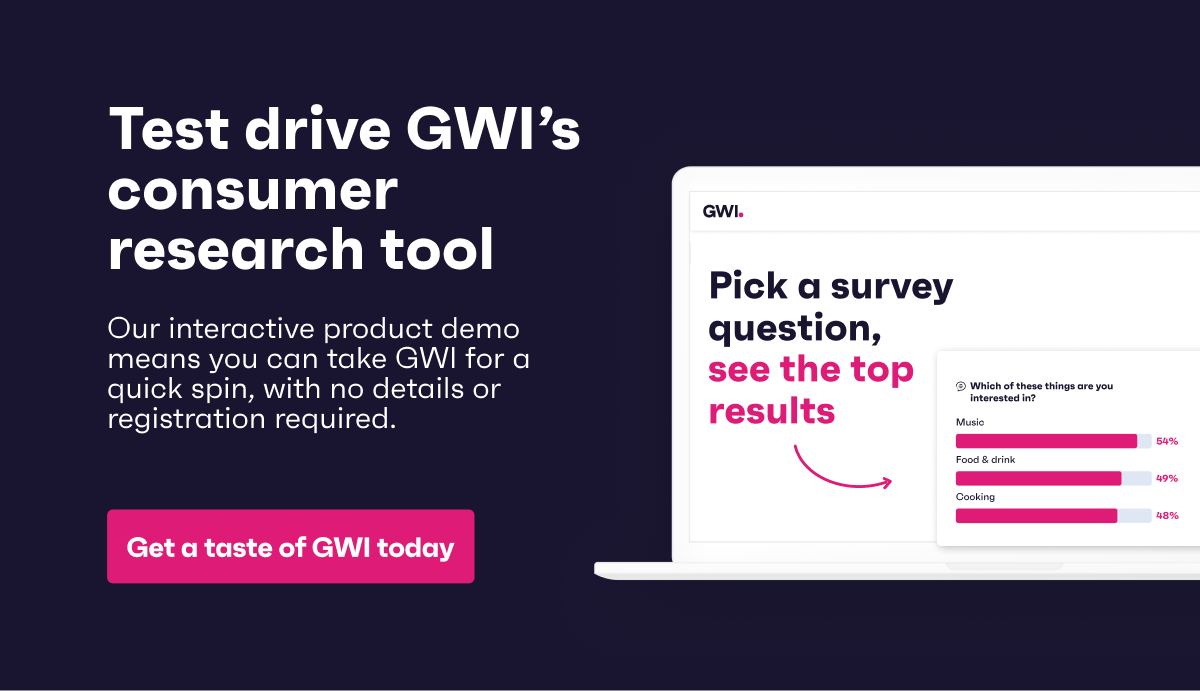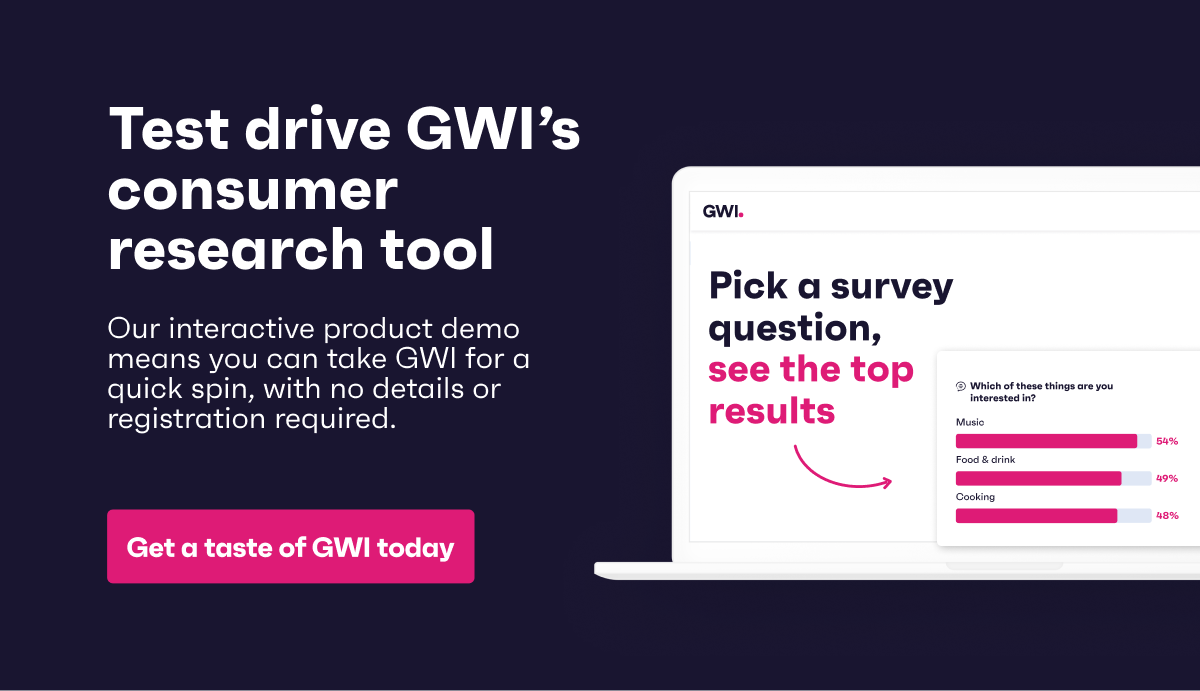Every business wants to promote its products, supercharge its content strategy, excel at consumer research, generate leads, boost sales, and increase brand awareness – all with minimum hassle and maximum impact.
The question, of course, is how? And that’s where marketing tools for business come in.
Apps, platforms, solutions – call ‘em what you like, they’re all ultimately about one thing: making or saving money for businesses like yours. Actually that’s two things, but let’s not split hairs.
There are literally hundreds of marketing tools for businesses out there, so to make your life easier we’ve rounded up 19 top examples that are worth your attention. But before we dive in, let’s quickly define “marketing tools” so we’re all on the same page.
What are marketing tools?
In this context, “marketing tools” refers to a broad sweep of techniques and resources delivered via digital platforms. Different business marketing tools serve different purposes, so businesses often use several tools simultaneously. The question, of course, is which ones are right for you?
The 19 best marketing tools for business
OK, “best” is relative as it’ll depend on your goals and budget. Scalability and customer support will almost certainly be important, as will compliance and privacy features.
But the ultimate test of “best” is probably our old friend ROI. The key question for any tool is: will it deliver a demonstrable return on investment, for example by opening up new revenue opportunities, or delivering efficiency savings? So for this blog we’ve defined “best” as the potential to produce benefits. If that’s wrong then we don’t want to be right.
Now we’ve agreed our criteria, let’s meet the 19 marketing tools for business you need to know about, grouped by function.
Consumer research tools
As the name implies, consumer research tools gather information about your consumers’ lifestyles, behaviors, needs, and preferences, usually in relation to a particular product or service.
Examples of consumer research in action include finding ways to improve consumer perception of your product, creating buyer personas, and defining market segments, all of which help you market your product to different types of customers
1. GWI
That’s us, so we’ll try to keep this objective: GWI is a global consumer research platform that offers instant access to data representing the views, behaviors, and interests of nearly 3 billion consumers in 53 markets. With insights available on-demand and an intuitive workflow that doesn’t require in-depth research expertise, GWI has become the go-to tool for agencies, brands, and businesses.
GWI shows exactly what drives buyers, giving users the answers they need, when they need them. In addition to our flagship Core data set, – the world’s largest ongoing study of online audiences – our specialist data sets cover the US, alcohol, automotive, consumer tech, gaming, luxury, sports, travel, work, and kids.
Want to know more about other players out there? Then check out our recent review of market research companies

Web analytics tools
Web analytics tools analyze the behavior of your site visitors by tracking, measuring, and reporting on site traffic, visitor source, and user clicks. Web analytics tools shed light on what your users are actually doing on your website, information you can use to amplify what’s working and fix what isn’t.
2. Google Analytics
Google Analytics collects user activity data from your website on things like session duration, pages visited per session, where users are coming to your site from, and the bounce rate of individual users. It’s free, easy to install and use, and offers customizable reports, dashboards, and data collection.
Currently part of the Google Marketing Platform, Google Analytics launched in 2005 and is now one of the world’s most widely used web analytics services. As of late 2023, Google Analytics 4 is used by around 13.5 million websites globally.
3. Kissmetrics
Kissmetrics is an event-driven, user-orientated analytics platform that helps you identify, understand, and improve the metrics that drive business online. Like all web analytic tools it tracks user behavior on your site, information that helps you make better product and marketing decisions.
In terms of functionality, Kissmetrics focuses on data discovery and visualization, keyword tracking, and funnel analysis. Compared to Google Analytics, the industry consensus seems to be that Kissmetrics is a little more user-centric and better at behavior-based data tracking, while Google Analytics is more effective for event tracking.
Social listening tools
Social listening is a powerful solution for brands who want to keep their ear to the ground, gathering the raw, unmediated thoughts and opinions from consumers who’re posting on social media. Many social listening tools store data for as long as a couple of years, making them great for trend analysis that needs to compare current and past conversations.
4. Brandwatch
Brandwatch is the world’s leading social listening platform, collecting data from 95M+ sources including blogs, forums, social networks, news sites, videos, and review sites.
The Brandwatch platform features a “social inbox” that lets you manage all incoming social media mentions, comments, messages, and reviews in one place. Brandwatch can analyze thousands of conversations in real-time to help you understand how a campaign is performing or a potential crisis is unfolding, as well as monitoring the tone and impact of relevant brand mentions. The result helps brands create winning content that engages their consumers.
5. Buzzsumo
BuzzSumo is a cloud-based content research tool that helps marketers and creators discover the topics that are currently trending, find the most engaging pieces of content, and discover new outreach opportunities.
In practice that means identifying the content that’s receiving the most shares, links, and comments – making Buzzsumo a sort of on-demand helpline for anyone who needs to know what’s currently blowing up big.
CRM tools
CRM – customer relationship management – tools help organizations track their customers as they move through the different stages of the buying journey. That information helps marketing and sales teams streamline their processes and build stronger customer relationships, which in turn can translate into higher sales and improved profitability.
6. HubSpot
HubSpot is a CRM platform containing a suite of marketing, sales, service, operations, and content management tools that help you deliver the best experience for your customers.
Specifically designed to support businesses as they scale, Hubspot is an all-in-one solution built around five integrated main products – or Hubs – that align sales and marketing teams, foster sales enablement, boost ROI, and optimize inbound marketing strategy to generate more qualified leads.
Ultimately HubSpot’s platform helps users grow their business faster by focusing on what matters most: their customers.
7. Zendesk
Zendesk is a customer service and engagement platform designed to help you streamline customer interactions, boost efficiency, and grow customer satisfaction.
It allows you to centralize customer inquiries from a range of channels including email, chat, social media, and phone calls. This consolidated approach simplifies communication and makes sure every customer query gets noticed and dealt with correctly.
A key feature of Zendesk is its ticketing system which automatically organizes and prioritizes customer requests. Zendesk’s reporting and analytics tools also provide valuable insights into customer interactions, helping you identify trends, areas for improvement, and opportunities for growth.
Lead generation tools
This group of marketing tools helps you attract, capture, and nurture leads – in other words, people who’re potentially interested in your goods or services. By automating and streamlining the lead generation process, these tools make it easier for companies to identify and engage with their target audience.
8. Zapier
Zapier automates tasks and workflows to boost lead generation by automatically connecting apps and services without the need to build any integration yourself.
It’s basically the “glue” that enables hundreds of web apps and services to work together seamlessly, linking and synchronizing their functionality so recurring processes – like running email or social campaigns – execute automatically.
This sort of automation simplifies complex procedures, reduces human interaction and error, and frees up your time to focus on other more valuable tasks.
9. Unbounce
Unbounce describes itself as a “conversion intelligence platform”, combining an AI-powered drag ‘n’ drop landing page builder with conversion optimization features like sticky bars, pop-ups, and overlays, in order to generate leads, clickthroughs, and signups.
In action, Unbounce optimizes traffic by automatically directing visitors to their optimum landing page, helping you drive leads and build higher-converting campaigns in a way that lets you scale your marketing to reflect your goals.
Email marketing tools
Email marketing uses the humble email to promote products or services by keeping customers up to date about what’s new in your world. It can play a vital role in lead generation, brand awareness, relationship building, and customer engagement between purchases.
10. Mailchimp
Mailchimp is a highly respected one-stop shop for email marketing. It lets you manage email lists, design emails, automate campaigns, and keep track of different metrics, all from a single dashboard.
Mailchimp is easy to use, even for those who’ve never put together an email campaign before. It includes customizable templates, a drag ‘n’ drop email designer, list management and segmentation tools, automated campaign support, and analytics and reporting. Mailchimp also offers a ton of integration options for other platforms and tools, helping you streamline workflow and automate regular marketing tasks.
11. MailierLite
MailerLite is an easy-to-use email marketing service that lets you create professional emails, pop-ups, workflows, and websites thanks to features like newsletter creation, website and landing page building, and e-commerce product selling.
Features that go beyond the basics of email marketing mean you can collect cross-channel data and send targeted emails. It’s also known for its extensive range of features – even for users who choose MailerLite’s free plan – including campaign reporting, email automation, subscriber list management, and result tracking.
SEO marketing tools
SEO marketing tools help sites to rise up search engine rankings by providing data and alerts about the overall health and success of a website. They uncover areas of opportunity and identify weaknesses or issues that could prevent you from getting the visibility you want on the all-important SERP – aka search engine results page.
12. Ahrefs
Ahrefs offers many essential SEO features such as keyword research, competitor analysis, backlinking analysis, tracking positions of pages, and comparing SEO visibility scores.
Its user-friendly interface makes Ahrefs easy to navigate, and you can access and analyze lots of data on various SEO operations like organic traffic metrics and search results page rankings. Ahrefs also has a huge collection of SEO tools you can use to boost your results page ranking and grow your sales.
13. Semrush
Semrush is an all-in-one SEO marketing tool that helps you formulate, maintain, and improve digital marketing campaigns. You can quickly recognize patterns and trends, helping you review your on-page SEO and identify any areas that need to be optimized for more efficient lead generation.
Semrush also shows which keywords your competitors are using and how they’re ranked. You can see how you stack up against your competitors, and make data-driven decisions around the right keywords to target in order to boost organic search and Google ad campaign results.
Website optimization tools
The ultimate aim of web optimization is to give users the best possible online experience, so these tools collect data on how people are using your website – information you can use to see which features or content are working well and which aren’t.
14. Hotjar
Hotjar describes itself as a “product experience insights platform”, combining user behavior analysis and customer feedback to help you understand what users do on your site and why they do it.
Hotjar provides detailed heatmaps so you can see exactly where customers spend time, or whether they’re just scrolling through pages quickly without clicking on anything. Hotjar also offers survey tools to get feedback about your products and services directly from customers. Last but not least, Hotjar allows you to automate the entire process of collecting insights.
15. ScreamingFrog
ScreamingFrog is a site crawler that analyzes a site’s structure to identify any technical issues that could impact its search engine ranking – things like broken links, duplicated content, or missing title tags.
ScreamingFrog can also generate an xml sitemap for your site, analyze page titles and meta data, and carry out data scraping to find out which keywords drive most traffic to your site – all of which helps with competitive analysis.
Product development tools
These tools help product teams manage the product development process from ideation to launch and beyond. Product managers, designers, and engineers use these tools to develop new products and services, update existing offerings, and create internal products.
16. Unleash
Unleash is an open source website feature management tool that offers multiple ways to create and manage “feature toggles”. If you’re unfamiliar with the term, a feature toggle – sometimes known as a feature flag or switch – lets developers turn website features on and off (in other words, make them visible or hidden from users) without the need to change any code.
The result streamlines development workflows, accelerates software delivery, and helps teams control how and when they roll out new features.
17. Trello
Trello is a collaboration tool that organizes projects into “boards” that give you a single, unified view of who’s working on what, and where each project is in its development cycle.
Trello’s interface uses a visual metaphor called “kanban”, a Japanese word that translates as “visual card”, each of which contains details about a task. You can then organize these cards in whatever way you like on a virtual whiteboard to represent the different stages of the production process – to do, doing, and done – with everything fully shareable with all team members.
Project management tools
Project management tools help plan, organize, and manage projects. Depending on the sophistication of the individual platform, these tools can manage project estimation and planning, scheduling, cost control and budget management, resource allocation, collaboration, communication, decision-making, quality management, time management, and so on.
18. Asana
Asana is a cloud-based task management system/dashboard that lets you manage, communicate, and organize your tasks and projects in one place, with a big emphasis on collaboration and productivity.
Asana lets you keep track of who’s responsible for each stage. It centralizes all the information related to your tasks, including necessary steps, due dates, and so on. It’s also really flexible, meaning you have complete control over what kind of work to track and exactly how to use its tools.
19. Wrike
Wrike is designed to help with two high level tasks: project management, and team collaboration. Its project management features let teams track dates and dependencies, manage assignments and resources, and track time via an interactive Gantt chart, a workload view, and a sortable table you can customize to store project data.
Wrike’s team collaboration features support colleague conversations, asset creation, and decision-making across teams. They include Wrike’s live co-editor, discussion threads on tasks, tools for attaching and editing documents, and tracking changes.
Last words
So there we have it folks. As we’ve seen, business marketing tools provide companies with valuable analytics that can guide their decision-making. By monitoring KPIs, conversion rates, and customer engagement, the right tool – or more likely tools – can support specific marketing objectives and streamline marketing activities like promoting a product or services, optimizing content strategy, generating leads, boosting sales, and increasing brand awareness.

Marketing tools FAQs
What are marketing automation tools?
Marketing automation tools take care of repetitive tasks like email sends and social media posting. The result frees staff to focus on more productive activity, as well as making message customization much easier.
What are digital marketing tools?
Digital marketing tools help businesses attract, engage, sell, and retain business online. This could cover everything from social media and advertising, to content optimization.
How do you create a marketing strategy?
The first step in creating an effective marketing strategy is to clarify your business objectives and marketing goals. After that you need to understand your clients, create your message, agree a budget, determine your channels, and finally measure your success.









